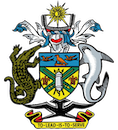The oversight role of the Solomon Islands Ombudsman and by extension, the Office of the Ombudsman (OOSI), is afforded to by two legal authorities: the pdf Solomon Islands Constitution (506 KB) and the Ombudsman (Further Provisions) Act 1980 (Cap 88). The latter has been repealed and replaced with the pdf Ombudsman Act 2017 (1.83 MB) .
The Constitution
The Solomon Islands Constitution establishes the Ombudsman’s Office (OOSI) as an independent body and defines the powers and functions of the Ombudsman and his or her Office and reporting requirements.
Simply put, the Constitution gives legal authority to the Ombudsman to ensure that public institutions and public servants who fall under the Ombudsman’s jurisdiction and investigative powers, comply with the legal frameworks governing their administrative functions.
Furthermore, the Constitution defines the authorities who are exempted from the Ombudsman’s jurisdiction and Section 98(2) of the Constitution prohibits the Ombudsman from investigating matters that are of national security concern if notified of such a concern by the Prime Minister.
Apart from these legal concerns, the Constitution also authorizes the Ombudsman to take steps to pinpoint any defects in the application of any law (as may be identified during investigations) and consequently make recommendations for necessary changes to rectify the legal or administrative defect so that the ultimate effect would be one of fairness and justice.
The Ombudsman Act 2017
This new Act was passed by Parliament on the 26th July 2017 to repeal and replace the Ombudsman [Further Provisions) Act 1980 (OFPA). Despite such repeals, some provisions of this new law have adopted similar positions to the old Act.
Importantly, the new Act extends the Ombudsman’s oversight role to include contractors of public bodies which gives the Ombudsman the legal authority to investigate any complaints about the administrative conduct of a contractor of a Government Ministry or Agency.
The Whistleblowers Act 2018
Section 5(b) of the pdf Whistleblowers Protection Act 2018 (751 KB) names the Ombudsman as the appropriate authority to receive public interest disclosures relating to any act of alleged maladministration. The Act also affords any person making such disclosures, certain protection against liability and victimization.
The Anti-Corruption Act 2018
The pdf Anti Corruption Act 2018 (1.86 MB) establishes the Independent Commission Against Corruption (ICAC). Section 10 of the Act names the Ombudsman as one of the Office Holders or Bodies that the Commission is required to liaise with for the purposes of an investigation, including referrals of cases.
